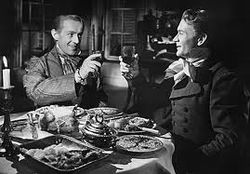 Happy New Year, in keeping with the situation! as Scrooge’s housekeeper might have said.
Happy New Year, in keeping with the situation! as Scrooge’s housekeeper might have said.
If you vegged out with the TV over the festive season, you can’t possibly have missed the fact that next month sees the 200th anniversary of Dickens’ birth. This obviously presents an irresistible reason for shoehorning him into a gardening blog; the only question being how.
Then, the BBC made a huge fanfare about Great Expectations. Shall I veer off into our great expectations of gardening or how plants have characters: how some sulk in a dark corner and never progress (Miss Haversham), others look delicate but have an iron will (Estella), some look hearty but are sensitive souls (Joe)?
No, I won't (and you needn't sigh with relief). I’m going to mention the portrait of a dedicated gardener.
Some of you will immediately know who's coming, but if your only experience of Great Expectations is this Christmas’s three-part adaptation, you won’t have a clue. This dreary, lifeless, “it’s Victorian England so get out the brown filter” production sucked all the subtlety from a tale filled with humour and memorable characters.
 Inexplicably many critics loved it. I suspect that many critics, not only haven’t read the book, but haven’t watched the next best thing: David Lean’s 1946 film. A few hormones went into overdrive, too, at the sight of Douglas Booth’s knitting-pattern features (I think Radio 4’s Woman’s Hour team might actually have tripped over each others' tongues as they discussed him). Still, some maintained their sanity, and there’s a fulminating condemnation from Howard Jacobson in The Guardian, a cry of anguish from Paul Bailey at its being "as crude as an episode of EastEnders", while Michael Deacon and Anne Billson of The Daily Telegraph moaned about miscasting.
Inexplicably many critics loved it. I suspect that many critics, not only haven’t read the book, but haven’t watched the next best thing: David Lean’s 1946 film. A few hormones went into overdrive, too, at the sight of Douglas Booth’s knitting-pattern features (I think Radio 4’s Woman’s Hour team might actually have tripped over each others' tongues as they discussed him). Still, some maintained their sanity, and there’s a fulminating condemnation from Howard Jacobson in The Guardian, a cry of anguish from Paul Bailey at its being "as crude as an episode of EastEnders", while Michael Deacon and Anne Billson of The Daily Telegraph moaned about miscasting.
Meanwhile, I opened the book, found my gardener and fell in love with Dickens all over again. Here’s Mr Wemmick, assistant to the enigmatic, powerful Mr Jaggers, talking to Pip in his garden:
“At the back, there’s a pig, and there are fowls and rabbits; then I knock together my own little frame, you see, and grow cucumbers; and you’ll judge at supper what sort of a salad I can raise. So sir," said Wemmick, smiling again but seriously, too, as he shook his head, “if you can suppose the little place besieged, it would hold out a devil of a time in point of provisions.”
Then, he conducted me to a bower about a dozen yards off, but which was approached by such ingenious twists of path that it took quite a long time to get at; and in this retreat our glasses were already set forth. Our punch was cooling in an ornamental lake, on whose margin the bower was raised. This piece of water (with an island in the middle which might have been the salad for supper) was of a circular form, and he had constructed a fountain in it, which, when you set a little mill going and took a cork out of a pipe, played to that powerful extent that it made the back of your hand quite wet.
“I am my own engineer, and my own carpenter, and my own plumber, and my own gardener, and my own Jack of all Trades,” said Wemmick, in acknowledging my compliments. “Well, it’s a good thing, you know. It brushes the Newgate cobwebs away, and pleases the Aged.”
He’s you, isn’t he? And me. Wemmick, the ordinary man with a tough job that strains his humanity, goes home, pours creativity into his garden (designed, note, to feel larger than it is), and is as proud as Punch.
 Of course, the little water feature wouldn't be everybody's taste. Nor would his home. This tiny cottage in Victorian suburbia has sham gothic windows, an impracticably small gothic front door, a roofline with pretend fortifications, and a flagstaff (up which Wemmick runs "a real flag" on Sundays).
Of course, the little water feature wouldn't be everybody's taste. Nor would his home. This tiny cottage in Victorian suburbia has sham gothic windows, an impracticably small gothic front door, a roofline with pretend fortifications, and a flagstaff (up which Wemmick runs "a real flag" on Sundays).
Even more ridiculously, he fires a cannon every evening, which thrills the Aged (who is, of course, Wemmick’s very deaf father—“Nod away at him, Mr Pip; that’s what he likes.”).
It's exaggerated in the best traditions of story-telling, but for Wemmick his home is truly his castle, and who among us doesn't recognise that delight in getting home, metaphorically (indeed, literally, in Wemmick's case) pulling up the drawbridge, and losing ourselves in the flowerbeds?
I doubt if Dickens had much time for gardening himself, but with his extraordinary ability to capture the essence of personality and depict human foibles, he surely makes us warm with affection to a fellow gardener, and smile at our own pretensions.
In the next post: working gardener and columnist Patrick Vickery relates the ups and downs of working with some eccentric clients.


Recent Comments